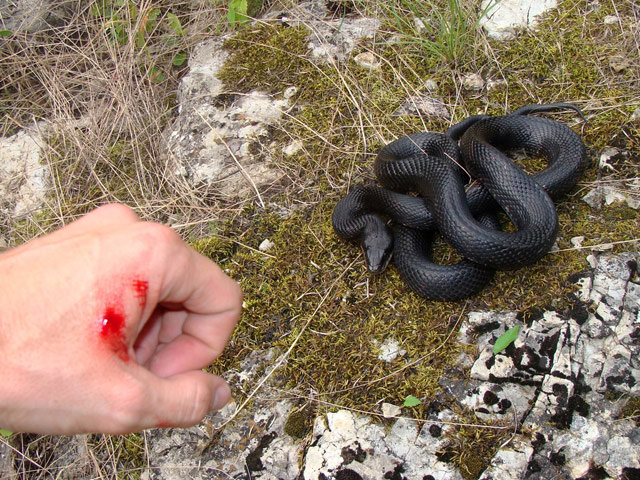The girl smiling, the bike locked... (B1)
Participle clauses (363)
Zkracování vět pomocí -ING a -ED
Zkracování vět pomocí -ING a -ED (participle clauses) – procvičování:
Na Landigo máme další související lekci: Vedlejší věty s ING (B1)
I noticed a pretty girl smiling at me.
|
I noticed a girl who was smiling at me.
|
|
I noticed a girl smiling at me.
|


Tzv. vedlejší vztažné věty (= věty, které začínají na WHO, WHICH, THAT...) můžeme někdy zkrátit pomocí -ING a -ED:
|
Do you know the man who is standing in front of the shop?
|
Znáš toho muže, který stojí před obchodem? |
|
Do you know the man standing in front of the shop?
|
Znáš toho muže stojícího před obchodem? |
|
Do you know the man who was injured in the car accident?
|
Znáš toho muže, který byl zraněn při autonehodě? |
|
Do you know the man injured in the car accident?
|
Znáš toho muže zraněného při autonehodě? |
Větu můžeme zkrátit pouze tehdy, pokud je rozvíjené podstatné jméno (the man) podmětem vedlejší věty:
|
I know the man who is standing there. (= I know the man. The man is standing there.)
|
|
I know the man standing there.
|
Whose is the bike locked next to the entrance?
|
Whose is the bike that is locked there?
|
|
Whose is the bike locked there?
|


The boy riding the skateboard is my youngest son.
|
The boy who is riding it is my son.
|
|
The boy riding it is my son.
|


The girl smiling, the dog barking...
Vedlejší větu je často možné zkrátit pomoc -ING, pokud se něco odehrává v danou dobu nebo pořád (trvale):
| Probíhající děj |
|---|
|
The woman (who is) waiting at the front desk is my sister.
|
|
The gentlemen (who are) sitting in the conference room are the CEOs of the company.
|
|
Were you scared of the dog (which was) barking outside?
|
| Trvalý děj |
|---|
|
I can't remember the name of the Italian (who is) living with Peter.
|
|
The hotel (that is) standing near the beach is rather expensive.
|
|
Let's go to a viewpoint (which is) overlooking the city!
|
Can you hear somebody knocking on the door?
| Probíhající děj: |
|
Can you hear somebody who is knocking?
|
|
Can you hear somebody knocking?
|


The room overlooking the sea was absolutely perfect for us.
| Trvalý děj: |
| The room that was overlooking the sea... |
| The room overlooking the sea... |


The brunette lying in the hammock is Joe's fiancée Ciarra.
| Probíhající děj: |
|
The brunette who is lying there is Ciarra.
|
|
The brunette lying there is Ciarra.
|


The bike locked, the building damaged...
Vedlejší věty zkrácené pomocí třetího tvaru slovesa (locked, damaged, stolen...) mají trpný význam:
|
The person (who was) murdered on Monday was a policeman.
|
Osoba, která byla v pondělí zavražděna, byl policista. |
|
The building (that was) damaged in the earthquake will be demolished.
|
Budova, která byla poškozena zemětřesením, bude zbourána. |
|
The painting (which was) stolen last week is worth a fortune.
|
Obraz, který byl minulý týden ukraden, má obrovskou cenu. |
Porovnejte:
|
The guy (who is) parking on the driveway will leave soon.
|
|
Whose is that scooter (which is) parked on my driveway?
|
|
The people (who are) speaking now are from Wales.
|
|
English (which is) spoken in Wales is difficult to understand.
|
|
American (who was) selling the boat wanted a million dollars for it.
|
|
The boat (which was) sold yesterday belonged to an American.
|
The soldier killed during the attack was only 25 years old.
| Trpný význam: |
|
The soldier who was killed during the attack was 25.
|
|
The soldier killed during the attack was 25.
|


Unfortunately, the famous band invited to the festival won't be able to play.
|
The band that was invited to the festival won't play.
|
|
The band invited to the festival won't play.
|


That's the red car driven by the thief, isn't it?
|
That's the car driving driven by him.
|


Zkrácené věty se často používají s vazbou THERE IS/THERE ARE:
|
Were there many people (who went) shopping at the weekend?
|
|
There's a bus (which is) parked right in front of the gate.
|
Look! There are dolphins swimming close to us.
| There are dolphins that are swimming... |
| There are dolphins swimming... |


Be quiet, there's a baby sleeping here.
|
There's a baby who is sleeping here.
|
|
There's a baby sleeping here.
|


Větu můžeme zkrátit, pokud je rozvíjené podstatné jméno (the French, a house...) podmětem vedlejší věty:
|
The French who was talking to me was funny. (= The French was talking to me.)
|
|
The French talking to me was funny.
|
|
We have a house which was built in 1990. (= A house was built in 1990.)
|
|
We have a house built in 1990.
|
Last night I was awakened by a dog barking loudly.
|
I was awakened by a dog that was barking. (= A dog was barking.)
|
|
I was awakened by a dog barking.
|


The tourist bitten by a snake needs an ambulance as soon as possible.
|
The tourist who was bitten by a snake, needs it. (= The tourist was bitten.)
|
|
The tourist bitten by a snake needs it.
|


Větu nelze zkrátit, pokud není rozvíjené podstatné jméno podmětem vedlejší věty:
|
The French who I was talking to was funny. (= I was talking to a French.)
|
Neříkáme: The French talking to was funny.
The friends who I'm missing so much are coming to visit me soon!
|
The friends who I'm missing are coming. (= I'm missing the friends.)
|
| The friends missing... |


Is this the same pizza that you were recommending to me?
|
Is this the pizza that you were recommending? (= You were recommending the pizza.)
|
| Is this the pizza recommending...? |


Zkracování vět pomocí -ING a -ED – nejdůležitější body a tip na závěr:
- Vedlejší vztažné věty můžeme někdy zkrátit pomocí -ING nebo -ED (třetí tvar slovesa).
- The girl who is smiling... → The girl smiling...
- The bike that is locked... → The bike locked...
- Doporučujeme si procvičit zkracování vět pomocí -ING a -ED (participle clauses) v našich cvičeních.
